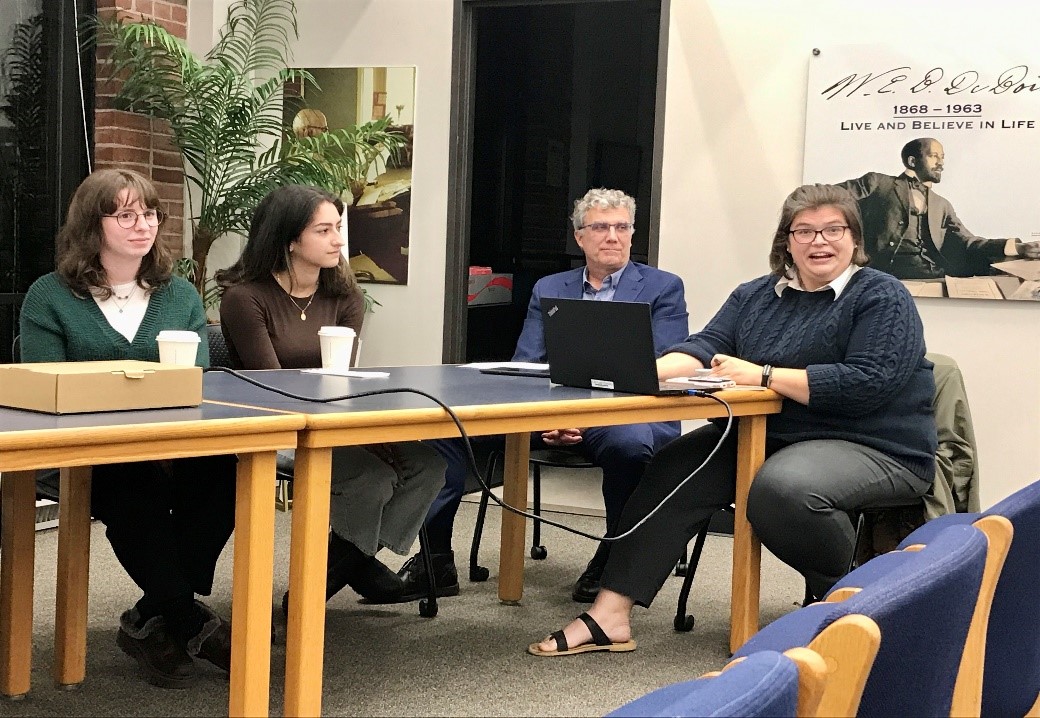On Oct. 24, W.E.B. DuBois library hosted a panel discussion in celebration of Open Access Week that is occurring Oct. 23 to 29, featuring the UMass World Librarians program.
Panelists included a six-member team that provided an overview of the program’s history and impact around this year’s Open Access Week theme, “Community over Commercialization.” Focused on connecting underserved communities to online open educational resources, the World Librarians program works with remote, offline schools and libraries in Malawi and Kenya.
Dr. Charlie Schweik, professor of environmental conservation and public policy, co-founded World Librarians in 2014 along with Carl Meyer of ShiftIT, a non-profit based in Blantyre, Malawi.
Reviewing the components behind the project, open education librarian Theresa Dooley explained the technology used to connect with Malawian students. Once a solar-powered computer lab is built in the partner school or library, each student is provided with a flash drive known as a “Keepod” to function as their personal hard drive.
Students are then able to access a wide database of open educational resources such as Khan Academy and Project Gutenberg through an offline Wi-Fi server called a “RACHEL” device. Any additional information students or teachers cannot find is requested through the program “Datapost,” which the student search team at World Librarians then processes.
Last year, World Librarians raised money through their MinuteFund to help finance a sustainable “Bloombox Learning Lab” that was repurposed from a shipping container and is now serving a refugee camp in Dzaleka, Malawi. The funds helped secure 20 laptops including Keepod technology, a rolling storage cart and other materials.
As request manager for World Librarians, junior English major Mia Klotz explained her role overseeing these requests. Assigning the student searchers to specific topics, each is responsible for locating and submitting the selected resource for review before sending to a local “courier” in the partner school. Drawing from her background as an English major, Klotz reflected on the ways her appreciation for literature expanded because of work with World Librarians.
“It just changes your perspective on how easily we access things,” Klotz said. “Just looking something up so simply, even an assignment for school, and they don’t have that access. Seeing pictures of the impact it’s having on them also impacts me a lot.”
Student searchers utilize YouTube, the Creative Commons (CC) website and Pressbooks Directory among many other platforms to find resources for the students. With the other student members coming from various disciplines, unique subject area expertise informs their approach to finding and sharing materials. Samantha O’Connor, a team searcher, found renewed interest in the program’s mission upon reflection of the scope of resources available.
“There’s a kind of sobering reality check when you get your first couple of requests,” O’Connor said. “You understand the lack of access people have. That can be a hard pill to swallow, but then you realize that we can do it. We have the tools, we have the system—the only thing stopping us is our desire to do it.”
Hari Krishnan, a graduate student in mechanical and industrial engineering, amplified these ideas, further exploring how World Librarians prioritize the viability of resources sent to students.
“We don’t want to bring any of our preconceived biases into what we think other people would want,” Krishnan said. “[Addressing this is] inherently within the search process, where we allow the schools and the students to request information.”
World Librarians RSO manager Sravya Tanikella highlighted the freedoms granted through the copyright license. Partner schools and libraries can revise, reuse and redistribute materials tailored to student needs, creating a personalized learning experience.
“Providing ideas for communities to totally build on and bring to the next level is what I think of [as] community over commercialization,” Tanikella said..“[Also], everyone mutually understanding that ideas can be shared and not kept to a sole individual person.
According to Dooley, accessibility of information is deeply intertwined with anti-colonialist framework the program employs. Combating disparities in technology access especially in the Global South, remains the core of the World Librarians’ mission.
O’Connor drew attention to the role of librariansin empowering students to articulate their information needs.
“[Our program] is concerned with the idea of organizing and preserving information to make information accessible—one of the key points of what librarians embody in their work,” O’Connor said.
While the program’s dimensions have grown in the past few years, their goals remain tethered to expanding outreach.
“We want to make sure that the work continues to flow,” Tanikella said. “So, creating some kind of self-sufficient RSO that will stand on its own two feet, both with the actual search operations, but also financially speaking, completely sufficient within the actual UMass organization itself.”
Additionally, the team hopes to retain University support for the “WorldRemit” service, which helped the program cover the personal cellular data costs incurred by teachers when sending and processing resource requests.
Looking ahead, the program plans to continue building community knowledge and understanding of open access resources, while exploring the possibility of creating a database to store past search requests received.




















